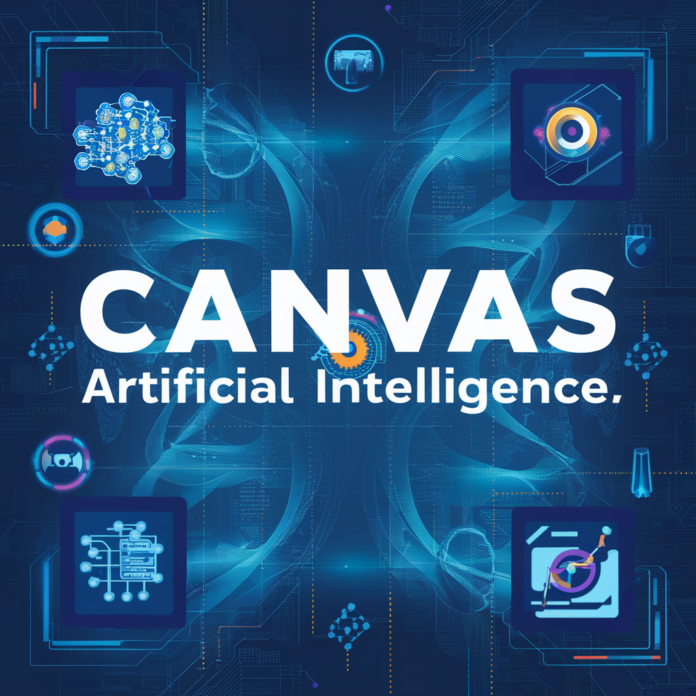Artificial Intelligence (AI) has become a transformative technology, reshaping various sectors, including education. Canvas AI represents the intersection of AI and educational platforms, enhancing teaching and learning experiences. This comprehensive guide delves into Canvas Artificial Intelligence, exploring its benefits, applications, and future prospects, with a focus on making the information accessible and easy to read for a basic English audience in the USA.
Artificial Intelligence (AI) is a powerful tool that will boost student success, empower educators, and transform teaching and learning methods.
Table of Contents
- Introduction to Canvas Artificial Intelligence
- Understanding Artificial Intelligence
- The Role of AI in Education
- What is Canvas AI?
- Key Features of Canvas AI
- Benefits of Canvas AI for Students
- Benefits of Canvas AI for Educators
- How Canvas AI Enhances Teaching and Learning
- Real-World Applications of Canvas AI
- Future of Canvas AI in Education
- Challenges and Considerations
- How to Get Started with Canvas AI
- FAQs about Canvas Artificial Intelligence
- Conclusion
1. Introduction to Canvas Artificial Intelligence
Canvas Artificial Intelligence (Canvas AI) refers to the integration of AI technologies into the Canvas Learning Management System (LMS). Canvas is a widely used LMS that supports teaching and learning in educational institutions. By incorporating AI, Canvas aims to elevate student success, empower educators, and transform educational methodologies.
2. Understanding Artificial Intelligence
Artificial Intelligence (AI) involves creating machines capable of performing tasks that typically require human intelligence. These tasks include learning, reasoning, problem-solving, perception, and language understanding. AI technologies encompass machine learning, natural language processing, computer vision, and robotics.
3. The Role of AI in Education
AI in education offers numerous benefits, including personalized learning, enhanced student engagement, and improved administrative efficiency. AI technologies can analyze vast amounts of data to provide insights, automate repetitive tasks, and offer tailored educational experiences.
4. What is Canvas AI?
Canvas AI integrates AI-driven tools and features into the Canvas LMS. These tools are designed to support educators and students by automating administrative tasks, providing personalized learning experiences, and offering actionable insights. Canvas AI leverages machine learning algorithms, natural language processing, and data analytics to enhance the educational process.
5. Key Features of Canvas AI
Personalized Learning Paths
Canvas AI can create personalized learning paths for students based on their learning styles, preferences, and performance. This ensures that each student receives a tailored educational experience that maximizes their potential.
Intelligent Tutoring Systems
AI-driven tutoring systems in Canvas AI provide real-time assistance to students. These systems can offer explanations, answer questions, and guide students through complex concepts.
Automated Grading and Feedback
Canvas AI automates the grading process, saving educators time and ensuring consistency. The system can also provide detailed feedback to students, helping them understand their mistakes and improve their performance.
Predictive Analytics
Predictive analytics tools in Canvas AI analyze student data to identify patterns and predict future performance. This allows educators to intervene early and provide support to students who may be struggling.
Natural Language Processing
Canvas AI uses natural language processing to understand and analyze text. This technology can be used to grade essays, detect plagiarism, and provide language support to students.
6. Benefits of Canvas AI for Students
Enhanced Learning Experience
Canvas AI personalizes the learning experience for each student, ensuring that they receive the support and resources they need to succeed.
Real-Time Assistance
Intelligent tutoring systems offer real-time assistance, helping students understand complex concepts and complete assignments more effectively.

Immediate Feedback
Automated grading and feedback provide students with immediate insights into their performance, allowing them to learn from their mistakes and improve.
Personalized Learning Paths
Canvas AI creates personalized learning paths, helping students progress at their own pace and according to their individual needs.
7. Benefits of Canvas AI for Educators
Time Savings
Automating administrative tasks such as grading and attendance tracking saves educators time, allowing them to focus on teaching and interacting with students.
Improved Insights
Predictive analytics provide educators with valuable insights into student performance, helping them identify areas where students may need additional support.
Enhanced Engagement
AI-driven tools and personalized learning paths enhance student engagement, making the learning process more interactive and enjoyable.
Consistent Grading
Automated grading ensures consistency and fairness in the evaluation process, reducing the potential for human error.
8. How Canvas AI Enhances Teaching and Learning
Canvas AI enhances teaching and learning by providing personalized, data-driven educational experiences. It leverages AI technologies to create a more efficient, effective, and engaging learning environment.
Personalized Learning
Canvas AI tailors the educational experience to each student’s needs, ensuring that they receive the support and resources necessary for success.
Data-Driven Insights
AI-driven analytics provide educators with valuable insights into student performance, helping them make informed decisions and provide targeted support.
Efficient Administration
Automating administrative tasks such as grading and attendance tracking allows educators to focus on teaching and interacting with students.
Engaging Learning Experiences
Canvas AI’s interactive tools and personalized learning paths enhance student engagement, making the learning process more enjoyable and effective.
9. Real-World Applications of Canvas AI
K-12 Education
In K-12 education, Canvas AI can be used to personalize learning, provide real-time assistance, and offer predictive insights into student performance.
Higher Education
In higher education, Canvas AI enhances the learning experience by providing personalized learning paths, automating administrative tasks, and offering predictive analytics.
Corporate Training
In corporate training, Canvas AI can be used to create personalized learning experiences, automate administrative tasks, and provide real-time feedback to employees.
Professional Development
Canvas AI supports professional development by offering personalized learning paths, providing real-time assistance, and offering predictive insights into performance.
10. Future of Canvas AI in Education
The future of Canvas AI in education is promising, with continued advancements in AI technologies expected to further enhance the educational experience. Some potential future developments include:
Advanced Personalization
Future advancements in AI will enable even more personalized learning experiences, with tailored content, assessments, and support for each student.
Enhanced Predictive Analytics
Improved predictive analytics will provide educators with even more accurate insights into student performance, helping them intervene early and provide targeted support.
Increased Automation
Continued advancements in AI will lead to further automation of administrative tasks, allowing educators to focus even more on teaching and interacting with students.
Improved Accessibility
AI technologies will continue to improve accessibility for students with disabilities, providing tailored support and resources to help them succeed.
11. Challenges and Considerations
Data Privacy
Ensuring the privacy and security of student data is a critical consideration when implementing AI technologies in education.
Ethical Considerations
The use of AI in education raises ethical considerations, including the potential for bias in AI algorithms and the need to ensure fairness and equity.
Implementation Challenges
Implementing AI technologies in education can be challenging, requiring significant investment in infrastructure, training, and support.
Acceptance and Adoption
Ensuring acceptance and adoption of AI technologies by educators and students is crucial for the successful implementation of Canvas AI.
12. How to Get Started with Canvas AI
Assess Your Needs
Identify the specific needs of your educational institution and determine how Canvas AI can help meet those needs.
Research Available Tools
Research the available AI-driven tools and features in Canvas AI and determine which ones are most suitable for your institution.
Develop an Implementation Plan
Develop a detailed implementation plan, including timelines, resources, and training requirements.
Train Educators and Staff
Provide comprehensive training to educators and staff to ensure they are comfortable using Canvas AI and can effectively integrate it into their teaching practices.
Monitor and Evaluate
Regularly monitor and evaluate the implementation of Canvas AI to ensure it is meeting the needs of your institution and making a positive impact on teaching and learning.
13. Conclusion
Canvas Artificial Intelligence represents a significant advancement in the field of education, offering numerous benefits for students and educators. By providing personalized learning experiences, automating administrative tasks, and offering data-driven insights, Canvas AI enhances the teaching and learning process. This comprehensive guide aims to provide valuable information and insights into Canvas AI, helping educational institutions make informed decisions and successfully integrate AI technologies into their practices.
14. FAQs about Canvas Artificial Intelligence
Q1: What is Canvas AI?
Canvas AI integrates AI-driven tools and features into the Canvas LMS to enhance teaching and learning experiences.
Q2: How does Canvas AI personalize learning?
Canvas AI creates personalized learning paths based on individual student needs, preferences, and performance.
Q3: Can Canvas AI automate grading?
Yes, Canvas AI automates the grading process, saving educators time and ensuring consistency.
Q4: What are the benefits of Canvas AI for educators?
Canvas AI saves time by automating administrative tasks, provides valuable insights through predictive analytics, and enhances student engagement.
Q5: Is Canvas AI suitable for K-12 education?
Yes, Canvas AI can be used in K-12 education to personalize learning, provide real-time assistance, and offer predictive insights into student performance.
Q6: What are the challenges of implementing Canvas AI?
Challenges include data privacy, ethical considerations, implementation costs, and ensuring acceptance and adoption by educators and students.




